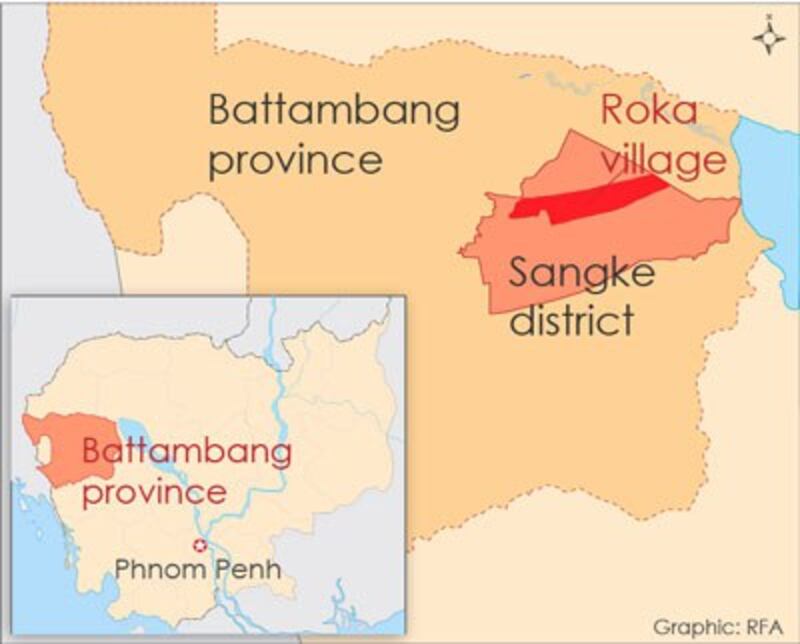More than 80 residents of a remote village in northwestern Cambodia, including children and elderly women, have tested positive for HIV/AIDS and may have been infected by contaminated needles during medical treatment, health officials said Tuesday.
One official has described the result as unprecedented in the country and the authorities have ordered a verification.
Teng Kunthy, secretary general of Cambodia’s National AIDS Authority, told RFA’s Khmer Service that 663 residents of Roka village in Battambang province’s Sangke district had received blood tests since reports of a mass infection emerged last week, with 82 confirmed positive for HIV/AIDS.
“The preliminary results show that 90 people are positive—71 adults and 19 children,” he said, adding that 82 were later confirmed to be HIV/AIDS cases.
Battambang provincial health director Voeun Bunret told RFA that blood samples of all 90 were being sent to a medical team in the capital Phnom Penh to verify the results before informing villagers.
Agence France-Presse quoted Hei Sik, a provincial HIV/AIDS program director, as saying that the infection rate was “the highest I have ever seen,” adding that among the villagers confirmed positive were women aged in their 70s and 80s.
According to a preliminary investigation, the mass infection was likely caused by contaminated needles during medical treatment by an unqualified health-care provider, Teng Kunthy said.
“There are only two [likely] reasons—drug injections or medical injections through private health services, though our investigation suggests it is not due to drug injections,” he said.
“We interviewed the patients and found that most of them … received treatment from a local volunteer health-care provider in the village, who is not a professional and only has some basic medical knowledge. We tried to communicate with him, but he has been missing for the last two days.”
Teng Kunthy urged the residents of Sangke district to remain calm, saying the government would control the spread of the disease, and called on all villagers in the area to undergo blood tests.
He said that health officials had already provided medical treatment kits to the 82 villagers who had been confirmed positive for HIV/AIDS and were conducting a campaign to educate them about how to prevent the infection of others.
“We want them to understand that patients can take medication and should not infect others, and that we will provide medical services for them,” he said.
A resident of Roka village who spoke to RFA on condition of anonymity said that he and three other members of his family, including two of his children, had tested positive for HIV/AIDS, adding that he suspected they had been infected through medical injections.
“I don’t know why almost my entire family got infected,” he said.
“I believe that we were infected through contaminated needles, but I don’t know from which health-care workers. I appeal to the Ministry of Health to find the real cause of the infection.”
Ongoing fight

Teng Kunthy said the mass infection was distressing in light of Cambodia’s recent work in fighting HIV/AIDS, which has won praise from the international community.
“We are saddened by this news, because … Cambodia has been a leader amongst countries that are reducing the disease, and the government recently promised to eliminate [new infections] by 2020,” he said.
Last week, Prime Minister Hun Sen committed to stopping new HIV infections in Cambodia by 2020 as the government allocated U.S. $3.7 million of the national budget to HIV treatment from 2015 to 2017—the first time it had earmarked funds for the country’s treatment program.
According to the United Nations’ AIDS agency, new HIV infections in Cambodia dropped by 67 percent from 3,500 in 2005 to 1,300 in 2013.
Cambodia’s National AIDS Authority says the rate of HIV infection among people aged 15 to 49 has declined from 0.6 percent in 2013 to 0.4 percent in 2014.
More than two-thirds of the 75,000 people living with HIV in the country receive antiretroviral therapy—the highest percentage of treatment access in the region, UNAIDS said.
Reported by Ham Chamroeun for RFA’s Khmer Service. Translated by Samean Yun. Written in English by Joshua Lipes.
